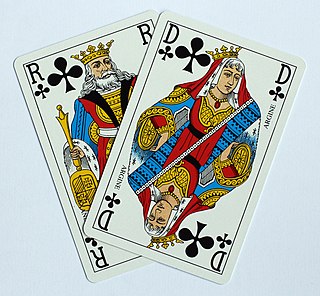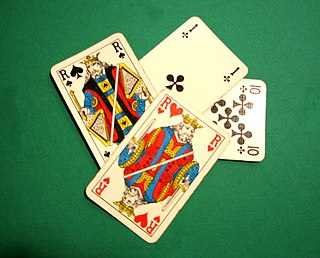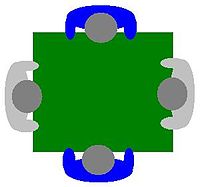
Contract bridge, or simply bridge, is a trick-taking card game using a standard 52-card deck. In its basic format, it is played by four players in two competing partnerships, with partners sitting opposite each other around a table. Millions of people play bridge worldwide in clubs, tournaments, online and with friends at home, making it one of the world's most popular card games, particularly among seniors. The World Bridge Federation (WBF) is the governing body for international competitive bridge, with numerous other bodies governing it at the regional level.

Pinochle, also called pinocle or penuchle, is a trick-taking ace–ten card game, typically for two to four players and played with a 48-card deck. It is derived from the card game bezique; players score points by trick-taking and also by forming combinations of characters into melds. It is thus considered part of a "trick-and-meld" category which also includes the game belote. Each hand is played in three phases: bidding, melds, and tricks. The standard game today is called "partnership auction pinochle".

Whist is a classic English trick-taking card game which was widely played in the 18th and 19th centuries. Although the rules are simple, there is scope for strategic play.

Spades is a trick-taking card game devised in the United States in the 1930s. It can be played as either a partnership or solo/"cutthroat" game. The object is to take the number of tricks that were bid before play of the hand began. Spades is a descendant of the whist family of card games, which also includes bridge, hearts, and oh hell. Its major difference as compared to other whist variants is that, instead of trump being decided by the highest bidder or at random, the spade suit always trumps, hence the name.

Forty-fives is a trick-taking card game that originated in Ireland. The game is popular in many communities throughout Atlantic Canada as well as the Gaspé Coast in Québec. Forty-fives is also played in parts of Massachusetts and southern New Hampshire in New England, United States, as well as in the South Island of New Zealand.

Belote is a 32-card, trick-taking, ace–ten game played primarily in France and certain European countries, namely Armenia, Belgium, Bulgaria, Croatia, Cyprus, Georgia, Greece, Luxembourg, Moldova, North Macedonia, Bosnia and Herzegovina and also in Saudi Arabia and Tunisia. It is one of the most popular card games in those countries, and the national card game of France, both casually and in gambling. It appeared around 1900 in France, and is a close relative of both Klaberjass and klaverjas. Closely related games are played throughout the world. Definitive rules of the game were first published in French in 1921.
Romanian whist is a variant of whist which is similar to the English or American game oh hell. It is currently popular in Romania, and there it is simply called "whist".
The best chess player in Christendom may be little more than the best player of chess; but proficiency in whist implies capacity for success in all these more important undertakings where mind struggles with mind. Edgar Allan Poe
Pedro is an American trick-taking card game of the all fours family based on auction pitch. Its most popular variant is known as cinch, double Pedro or high five which was developed in Denver, Colorado, around 1885 and soon regarded as the most important American member of the all fours family. Although it went out of fashion with the rise of auction bridge, it is still widely played on the western coast of the United States and in its southern states, being the dominant game in South Louisiana. Forms of the game have been reported from Nicaragua, the Azores, Niobe NY, Italy, and Finland. The game is primarily played by four players in fixed partnerships, but can also be played by 2–6 individual players.

Bid whist is a partnership trick-taking variant of the classic card game whist. As indicated by the name, bid whist adds a bidding element to the game that is not present in classic whist. Bid whist, along with spades, remains popular particularly in U.S. military culture and a tradition in African-American culture.
Pitch is an American trick-taking game equivalent to the British blind all fours which, in turn, is derived from the classic all fours. Historically, pitch started as "blind all fours", a very simple all fours variant that is still played in England as a pub game. The modern game involving a bidding phase and setting back a party's score if the bid is not reached came up in the middle of the 19th century and is more precisely known as auction pitch or setback.

Bid Euchre, Auction Euchre, Pepper, or Hasenpfeffer, is the name given to a group of card games played in North America based on the game Euchre. It introduces an element of bidding in which the trump suit is decided by which player can bid to take the most tricks. Variation comes from the number of cards dealt, the absence of any undealt cards, the bidding and scoring process, and the addition of a no trump declaration. It is typically a partnership game for four players, played with a 24, 32 or 36-card pack, or two decks of 24 cards each.
Sueca is a 4 player-partnership point trick-taking card game of the ace–ten family, and a popular variant of the Bisca card game. The game is played in Portugal, Brazil, Angola and other Portuguese communities. Its closest relative is the very similar German game Einwerfen.
3-5-8, also known as sergeant major for its popularity among members of the Royal Air Force, is a trick-taking card game for 3 players, based on whist, using a standard 52 card deck. 3-5-8 may be played as a gambling game, and there are many variations with names like "8-5-3" and "9-5-2" played throughout the world.
400 is a trick-taking card game played in two partnerships with a standard deck of 52 playing cards. The object of the game is to be the first team to reach forty-one points. The game somewhat resembles Spades, but with subtle differences. It was in the early years after the Ottoman Empire. Historically, the game is mainly played in Syria, Lebanon, Palestine, Jordan, Honduras, and The Philippines. It is similar to the game Tarneeb, which is also played in the region.

Twenty-eight is an Indian trick-taking card game for four players, in which the Jack and the nine are the highest cards in every suit, followed by ace and ten. It thought to be descended from the game 304, along with similar Indian games known as "29", "40" and "56".
Smear is a North-American trick-taking card game of the all fours group, and a variant of pitch (setback). Several slightly different versions are played in Michigan, Minnesota, Northern and Central Iowa, Wisconsin and also in Ontario, Canada.

Dummy whist is one of many variants of the classic trick-taking card game Whist. The general rules of dummy whist are similar to that of bid whist, with two notable exceptions. Bid whist is played by four players, whereas dummy whist is played by only three. Secondly, instead of dealing a kitty, a dummy hand is dealt to be on the team of the player who wins the auction.

The following is a glossary of terms used in card games. Besides the terms listed here, there are thousands of common and uncommon slang terms. Terms in this glossary should not be game-specific, but apply to a wide range of card games played with non-proprietary packs. It should not include terms solely related to casino or banking games. For glossaries that relate primarily to one game or family of similar games, see Game-specific glossaries.
Call-ace whist or Danish whist is a card game for four players playing in variable partnerships. It is the most popular form of Whist in Denmark, where it is often just called "Whist". It has a well developed bidding system and has imported from the traditional Danish game of Skærvindsel the feature of determining the partnerships by 'calling an ace'. John McLeod records that there is also a version of Danish whist in which there are fixed partnerships.

Priffe or Preference is a classic Swedish, trick-taking card game for four players who form two teams of two. It is an elaboration of Whist that involves bidding, but this is a different form from that in American Bid Whist. Together with Vira, Priffe was one of the most common card games in Sweden until superseded by Bridge.












